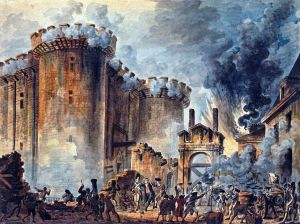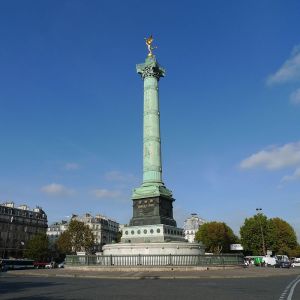On the morning of July the 14th 1789, the people of Paris had had enough. The medieval fortress Bastille, a symbol of the abuses of the monarchy, was stormed by a mob of a thousand men, women, and children. The garrisoned guards, sympathetic to the cause, joined the vainqueurs, helping to free the Bastille’s prisoners (all seven of them, including one chap who thought he was Julius Caeser). Ninety-eight attackers were killed. The Bastille’s governor was beheaded after kicking a pastry cook in the groin. It was the flashpoint of the Revolution, a pivotal moment in Europe’s history.
For Gaetano Polidori – father of The Vampyre‘s John Polidori and grandfather of Dante Gabriel and Christina Rossetti – the rise of the people against the injustices of poverty and monarchy really put a dampener on his morning stroll.
“I was passing by the Palais Royal while the populace were running to assault the fortress; and, having encountered a highly-powdered wig-maker, with a rusty sword raised aloft, I, not expecting any such thing, and hardly conscious of the act, had the sword handed over to me, as he cried aloud—‘Prenez, citoyen, combattez pour la patrie.’ I had no fancy for such an enterprise; so, finding myself sword in hand, I at once cast about for some way to get rid of it; and, bettering my instruction from the man of powder, I stuck it into the hand of the first unarmed person I met; and, repeating, ‘Prenez, citoyen, combattez pour la patrie,’ I passed on and returned home.”
In summary: “Screw you guys, I’m going home.”
As always, at moments of great historical significance, you have bystanders who’d really rather be at home with a cup of tea.
The Rossetti link to the Bastille doesn’t end there. I’ve already blogged about Dante Gabriel Rossetti’s youthful trip to the site of the Battle of Waterloo with fellow Pre-Raphaelite William Holman Hunt. While the battlefield with its meddlesome tour guides left DGR distinctly unimpressed, the site of the Bastille was far more stirring. In October 1849, he wrote home to his brother William:
The other day we walked to the Place de la Bastille. Hunt & Broadie smoked their cigars, while I, in a fine frenzy conjured up by association and historical knowledge, leaned against the Column of July and composed the following sonnet:
How dear the sky has been above this place!
Small treasures of this sky that we see here
Seen weak through prison-bars from year to year;
Eyed with a painful prayer upon God’s grace
To save, and tears which stayed along the face
Lifted till the sun set. How passing dear
At night, when through the bars a wind left clear
The skies, and moonlight made a mournful space.
This was until one night, the secret kept
Safe in low vault and stealthy corridor
Was blown abroad on a swift wind of flame.
Above God’s sky and God are still the same:
It may be that as many tears are shed
Beneath, and that man is but as of yore.
As someone who thoroughly enjoyed The Castle of Otranto, you can see how, on balance, Rossetti would prefer the sort of battle that involved ghastly dungeons and the tears of the damned. Revolution, of course, was a cause close to the hearts of the PRB, though perhaps, as this hasty sonnet suggests, it was the sentiment of revolution and not the act itself that lent itself to art.



